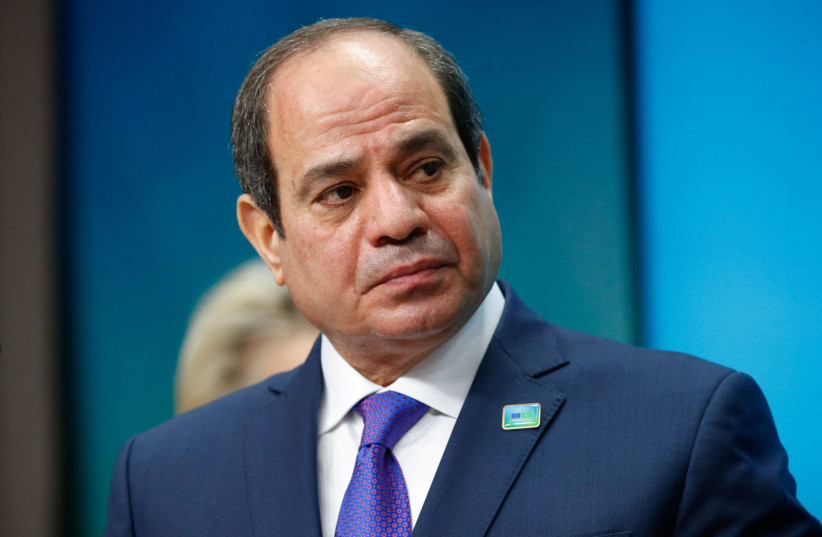Israeli Prime Minister Benjamin Netanyahu and Egyptian President Abdel Fattah el-Sisi discussed boosting bilateral ties after el-Sisi congratulated Netanyahu on returning to the premiership during a phone call on Sunday.
For more stories from The Media Line go to themedialine.org
Despite good relations between the leaders, and the benefits that good bilateral relations present for both of them, the future of ties between Israel and Egypt is uncertain and depends on the wider Arab reaction to policies of the new Israeli government.
Current relationship
Ofir Gendelman, Netanyahu's spokesperson for the Arab media, tweeted on Sunday: "Prime Minister Benjamin Netanyahu held today a phone conversation with the President of the Arab Republic of Egypt, Abdel Fattah el-Sisi. President el-Sisi congratulated Prime Minister Netanyahu on forming his new government."
"The two leaders stressed the importance of promoting peace, stability and security for the sake of both peoples and for all peoples in the Middle East," he added.

The Egyptian president’s office confirmed that el-Sisi congratulated Netanyahu and said that the president also asked him to refrain from creating tension in the region.
Egypt and Israel signed peace accords in Camp David in 1979 after 30 years of hostilities, including five wars, marking the first peace agreement between Israel and an Arab nation. Today, Israel also has diplomatic ties with Jordan, the United Arab Emirates, Bahrain, Morocco and Sudan.
Netanyahu and el-Sisi have a very close personal relationship, says Shaul Mishal, professor emeritus of Political Science at Tel Aviv University and visiting professor at Yale and Harvard universities. "There is a kind of personal trust between them," he told The Media Line.
But there is a great deal of uncertainty about the future of the relationship between the two countries because of Israel’s new government. "There are things beyond the relationship between those two leaders," he said.
Mishal explained that, despite the good personal relationship between el-Sisi and Netanyahu, the ties between the two countries may depend more on the wider context of relations between Israel and the Arab world.
"Even if, personally, Benjamin Netanyahu and el-Sisi would like to cooperate, it is hard to predict what will happen if all the Arab environment feels differently," he said.
He notes that, today, Egypt and Israel enjoy various benefits that come as a result of the ties, and most of them involve cooperation in the fields of security and defense. "There are many things [happening] behind the scenes," he said.
"I think that Israel is providing some intelligence related to their [Egypt's] domestic issues," Mishal said, explaining that Egypt suffers from hostilities of various groups connected to the Muslim Brotherhood and other organizations that oppose the Egyptian government.
Sara Kira, a doctoral candidate in international relations at CEU-San Pablo University in Madrid, and founder and director of the European North African Center for Research based in Cairo, says that for Israel it is important to keep good relations with Egypt because of the role that the North African Arab nation plays in the region.
"Egypt’s role in the Arab world has always been a major one. This is why it’s important for Israel to maintain good relations with Egypt, to stay in good ties with the Arab states," Kira told The Media Line.
Mishal also believes that, for Israel, Egypt is key when it comes to relating to various actors in the Arab world. "Egypt is also important strategically for Israel, because the unspoken relationship between Israel and Saudi Arabia is in part related to this relationship between Egypt and Israel," he said.
In addition, Mishal notes that Egypt also is crucial when the need comes for a mediator between Israel and Hamas. Through Egypt, he said, "Israel gets some unspoken agreements in relation to Hamas."
Kira adds that the common interest of both countries in maintaining their relationship involves the security of their borders, especially after a decade of fighting terrorism in the Sinai Peninsula, which has been of big concern to Egypt.
She says when el-Sisi asked Netanyahu to refrain from causing tension in the region he was referring mostly to escalating tensions between Israel and the Palestinians.
"This is the kind of tension in which Egypt is not interested at the moment," she said, adding that, instead, the Egyptian president believes that "the region has to focus more on Iran and its practices, along with the rising tension in other parts of the region that is of huge concern to Egypt, like that in Iraq and Libya," she noted.
Kira believes that the future of the ties between Egypt and Israel also depends on Netanyahu’s stances on mutual issues of strategic importance to both countries, such as gas found in the Mediterranean Sea, and the conflicts in Libya and Syria.
